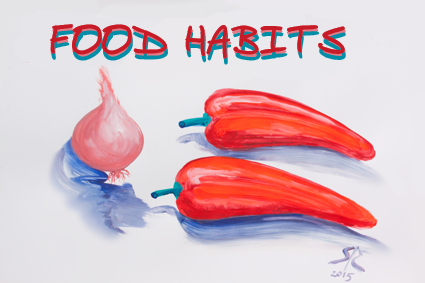Food Habits -Continually Upgrading To Good Ones
FOOD HABITS – CONTINUALLY UPGRADING TO GOOD ONES ~ ISSUE 197 ~ OCTOBER 27, 2015
By Diane Gold
FOOD HABITS
 Food habits are developed in all of us. We consume the same foods or types of foods over and over again because we like the result. When we do a behavior repetitively to satisfy a certain desire, we have a habit. It becomes something we can do without thinking, and we find ourselves doing it almost automatically.
Food habits are developed in all of us. We consume the same foods or types of foods over and over again because we like the result. When we do a behavior repetitively to satisfy a certain desire, we have a habit. It becomes something we can do without thinking, and we find ourselves doing it almost automatically.
In fact, sometimes, we have already completed the behavior before we realize we have done so. All to get a reward!
HABITS, IN GENERAL
When we first do something, we are just doing it. We may be motivated to please someone or satisfy our curiosity; but we haven’t yet experienced the reward until the behavior has been done.
When we repeat a behavior a second time or any time after that, we are doing it to get some type of thrill, benefit, recognition, reward. Something triggers us to do the behavior, whether it is the scent of an orange making us want to eat an orange, the dryness of our throat urging us to drink, the sight of a red scarf reminding us to call our sister. These biological responses lead us immediately to psychological responses.
As with all habits or acts of human behavior, triggers cause us to act positively or negatively toward ourselves. It is frame of mind that helps us choose which.
COMMON FOOD HABITS AND HOW TO MASTER THEM
HABIT (1) (a) Eating when full is a hugely popular habit. Why? This to do with the brain’s not having told body it is full.
HABIT (1) (b) Eating too quickly is common. We may not have been trained (yes, trained, or schooled, or educated, or groomed) to eat slowly. Or we may have forgotten. Either results in (a) because we have eaten so quickly that the brain cannot tell the body it has consumed for 20 or 30 minutes.
PUBLISHER’S NOTE ON HUNGER HORMONES
The following information is very simplistic. There are many other substances that have crucial effect on the following two hormones. So the info below is useful and needs further research on all our parts.
Ghrelin is a hormone that signals hunger. It also has a lot to do with regulating how we perceive reward.
Leptin is another hormone that signals when we are full or satisfied. If our body is being cooperative, leptin levels will increase to tell us we are full.
Both ghrelin and leptin have affect on when we feel hungry. Because so many other body substances and functions interact with them, it is very difficult to regulate hunger by supplementing the body with one or the other, alone.
ACTION STEP 1
The action steps for both (1) (a) and (1) (b) are the same.
DRINK a FULL glass of water before eating, waiting 5-15 minutes after drinking before starting to eat. The more slowly you drink the water, the more full the body will feel.
HABIT (2) Continuing to eat food we know is hurtful to our bodies is another common habit. This ties in to our habit of putting off change. We may have been raised eating the wrong foods. Science may have proven that our diets are wrong, but we haven’t made the necessary changes to maximize our health.
ACTION STEP 2
1) Make a list of 10 items you eat that come in a package.
2) Eliminate the most unhealthy for one month.
3) At the end of the month, eliminate another from the list.
4) If you can, maintain the originally eliminated food with the new elimination.
5) If this is too intense, just go with the newly eliminated food.
6) If you are hard core and able to maintain this for one year, continue to eliminate another packaged food from the list every month.
7) If you can, maintain this elimination permanently, and think about the benefit of whole foods vs. packaged goods.
HABIT (3) Eating food that causes pain to others may be more common than any other. We like what we like, and it doesn’t matter who or what we hurt.
ACTION STEP 3
1) Watch a video about migrants kidnapped for the Thai fishing industry that feeds pets and livestock that Americans eat. Do you want to support this? I am going to research my cat food now. I am vegan so do not eat livestock fed with this fish. I wonder if the fertilizer used in my organic produce uses these fish?
2) Read about or watch children who are too tired to go to school because they have to help with milking cows, feeding livestock so they will grow big and strong for sale, fishing, aquaculture. It’s scary to think that aside from GMO and vegan labeling, we have to know who tended our produce and did they have free will.
3) Watch a video on animal agriculture. It will give insight into what responsibility is ours if we use animals for anything in this life. Also, watch Cowspiracy, a movie at cowspiracy.com, about the abuse in factory farming, raising animals free range and why no one talks about it.
CONCLUSION
We have the ability to choose how we behave. As someone in the prison system said,
“I will always be free.”
Of course, he was talking about his mind, his will, his ability to choose. We have that. Let us use it to benefit ourselves, our offspring, our communities.

Can we release some of our greed, eating animals because we like how it tastes? Can we be kinder to each other, sharing when it doesn’t make us a profit?
Most of all, let us not have too fast a life that we neglect our own health. Let us use the newest science about food to eat well (remembering to notice which science makes profit for the funders that funded the research to get the science). And let’s learn food habits that support our body, mind and spirit. We can all do it. All it takes is repetition and our finding the reward in repeating the behavior.
![]()
If you wish to share your story, please hit reply in your email program to be contacted.
If you need habit help, go to warriorsofweight-consulting.
![]()
FEEDBACK
We value your feedback very much.
Please leave a comment below.
Please LIKE us on the website and at
WarriorsOfWeight on Facebook.
You can also follow us on Twitter @warriorsoweight.
Thanks.
![]()
DIANE GOLD, PUBLISHER AND AUTHOR
Diane Gold, Founder of Warriors of Weight, Turning Habits Into Health, is a mentor in tai chi, kung fu and meditation, a music, fitness and stress expert, dedicated mom, studying peaceful conflict resolution, habit replacement and certified in plant-based nutrition.
She studies habits and the people who have them.
She says,
“Habits are little parts of us that arise through repetitive behavior. The way we develop them is the way we can change them. It’s no secret. We can change them 1 step at a time.
There’s a TRICK to the change that most of us don’t employ:
Look at the next step only. That’s it. Looking at the end of the highway will not show us the way to get there. That’s why it’s important to take one step only. Then, we can take the next one step only. Then, and only then, can we take the next one step only.
Once we have taken one step only many times, we will become familiar with this one step. It will become second nature to us, even if we have other habits lurking around in the shadows. And we always will. All habits are ours. We can make them dormant by repeating new behaviors.
But dormant habits are just that – dormant, out of the way. For those of us who have strong habits that always want to become undormant and come out, we need to keep our eye on the one step. Some people can relax after a while. Some people need to keep the focus or the dormant habit will arise and take over.
And it’s important to upgrade our habits when we get new information. That means daily so that we can live our best lives. Every day.
“Finally, let’s take overall good care of ourselves because we are so worth it.”
![]()







